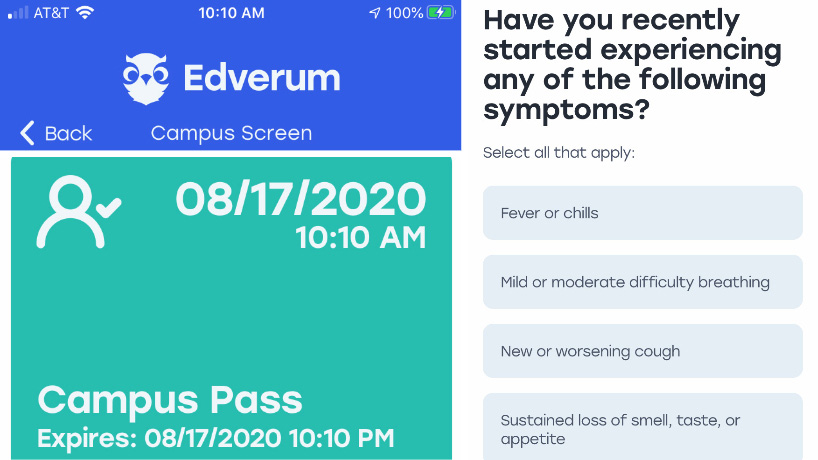
The Edverum Campus Screen app helps people keep track of their own health symptoms each day to inform their actions and help them prevent the spread of the coronavirus.
Members of the University of Missouri–St. Louis community will need to remain ever mindful of their own health to help ensure everyone can make a safe return to campus for blended classes beginning next week.
To that end, UMSL is requiring students and employees to self-monitor their health daily. To support this requirement, students, faculty and staff are asked to download the Edverum Campus Screen app created by Stanbridge University and use it to guide them through a daily health check, in addition to taking their own temperature each day before coming to campus. It’s just one part of the university’s efforts to prevent the spread of the coronavirus.
“The app is going to be a way for people to monitor their own health status, a way for people to have a sense of how things are changing,” said Chris Sullivan, the director of Health, Counseling and Disability Access Services. “It can provide some real basic guidance on the basis of CDC guidelines about when they need to seek some additional support.”
People who open the app and begin a health screening will be asked to answer a series of questions about their health symptoms, contacts they might have had with other people or recent travel.
The first question they’re asking to answer is whether they’re in an emergency situation and whether they’re experiencing symptoms such as trouble breathing, persistent pain or pressure in the chest, confusion, the inability to wake or stay awake or have bluish lips.
Assuming they are not facing an emergency, they are asked about less acute symptoms such as fever or chills; mild or moderate difficulty breathing; a new or worsening cough; a sustained loss of smell, taste or appetite; a sore throat; vomiting or diarrhea; or aching throughout the body.
Users are further prompted to state whether or not they’ve traveled internationally in the past 14 days and whether they’ve had close contact with anyone known to have had the previous symptoms during the same two-week period. They are also if they were wearing a mask when such contact occurred.
Depending on their answers, users either receive a green pass that suggests it’s safe to come to campus or they’re told to remain home and contact their health care provider, if an employee, or Health Services, if a student. They may also reach out to Health Services at UMSL with questions by calling (314) 516-5671 or logging into the health portal at health.umsl.edu.
“Having this app is a way of giving people a chance to look at their current health risks and possible symptoms,” Sullivan said. “It helps people to really think about it more intentionally and gives them some greater awareness about their own health status.”
The results of each self-screen are stored on the device for later review with color-coded summary cards highlighting a person’s status. The results eventually expire, at which users are prompted to begin a new self-assessment.
Missouri University of Science and Technology and the University of Missouri–Kansas City are also asking members of their campus communities to use the Campus Screen app.
Download the app for Android or iOS by clicking on the links.














